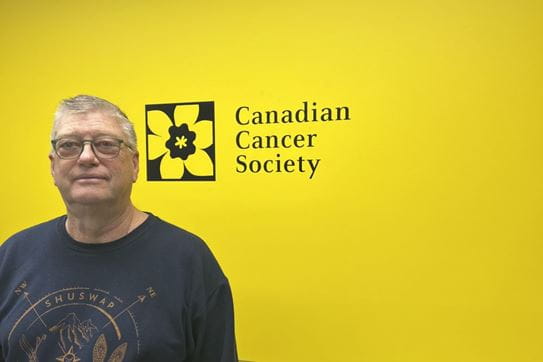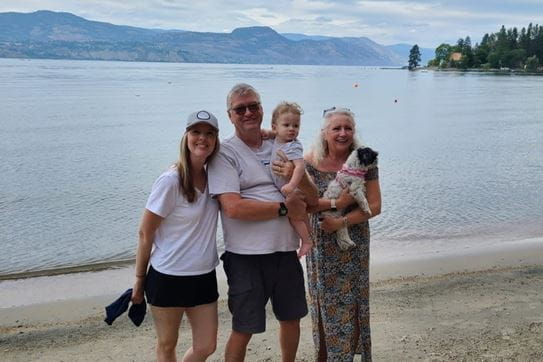Doug Berry learned that his accommodation fees at a Canadian Cancer Society lodge were covered after an historical investment from the BC government in 2023.
Doug's diagnosis
For years, Doug Berry experienced soreness and itchiness on his skin. Even after seeing multiple dermatologists for his ongoing skin issues, his condition didn’t improve.
While visiting Mexico in 2023 for his daughter’s wedding, Doug visited a new dermatologist who suggested that he get a biopsy done. Two weeks later, he got a letter encouraging him to visit an oncologist. Doug called his doctor right away.
In May of that year, a dermatologist in Kelowna immediately recognized Doug’s condition. After years of misdiagnoses, Doug was diagnosed with a rare skin cancer called Extramammary Paget’s disease (EMPD) at 71 years old.
A CT scan revealed that the cancer had spread into Doug’s lymph nodes, pelvis and chest. This caused issues with his treatment plan and Doug experienced several delays while his healthcare team tried to find a solution.
Doug and his wife had planned on staying in an RV site in Kelowna so he could easily travel to his treatment. But because of the delays in his treatment plan, it had gotten too late in the season and the RV wouldn’t have been suitable for the weather. They started looking for alternative accommodations and travel instead.
Doug learned about the Canadian Cancer Society’s (CCS) Southern Interior Rotary Lodge in Kelowna, a home away from home for people with cancer who needed to travel for their treatment. After visiting the lodge, he decided that it was the best place to stay during treatment.

Initially, Doug expected to pay a small fee for his room at the lodge. But in September 2023, a historical investment from the BC government meant that all of Doug’s lodge fees were covered.
The BC government announced $20 million in funding to support travel and accommodations for cancer patients living in rural and remote communities. The funding was equally split between CCS and Hope Air. This funding would help CCS increase access and eligibility for support services and help reduce travel expenses. This included eliminating lodge costs for people living with cancer in BC.
When he checked in, Doug also learned about the CCS Travel Treatment Fund (TTF), which provides financial support for people in British Columbia who need to travel for their treatment. Applying for the fund helped him cover the cost of gas and a few meals.
I haven’t had many expenses since. I just had to fill out a form. I think it really helps a lot of people that are financially burdened.
Finding support at the lodge
During his time at the lodge, Doug was able to focus on his treatment, form connections with the other residents and enjoy three home-cooked meals a day.
“The lodge is unbelievable. I gained two pounds from the meals in the first week,” Doug says. “It’s nice to be able to just walk across the parking lot and be at the cancer clinic.”
Doug was also able to spend time with his family regularly thanks to Wheels of Hope, a driving program that connects volunteer drivers with people who need transportation to and from cancer treatments. This service allowed him to travel home on the weekends.
“It’s a lot nicer being able to stay in the lodge during the week and to go home on the weekends instead of going home every day,” Doug shares. “Wheels of Hope is really accommodating. I used it every week. Everybody knows each other in the van after a bit – you become friends.”
After six weeks of treatment, Doug was able to go home right before the holidays. He is thankful for the support he found and encourages others to continue funding these services and cancer research.

Treatment and travel
People who must travel to receive cancer treatment often face extra challenges. The Canadian Cancer Society is dedicated to reducing the financial burden of travelling for treatment in British Columbia. With the Travel Treatment Fund, we hope to help cancer patients concentrate on what matters most – their treatment and recovery.
